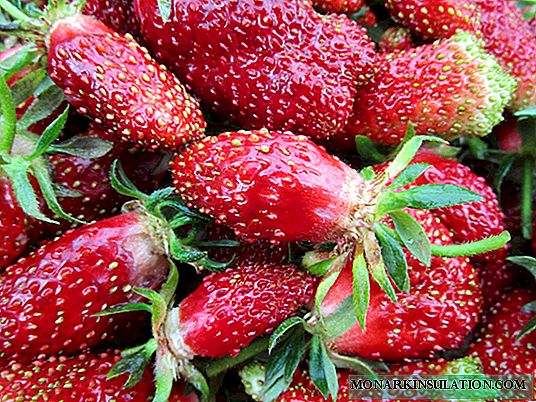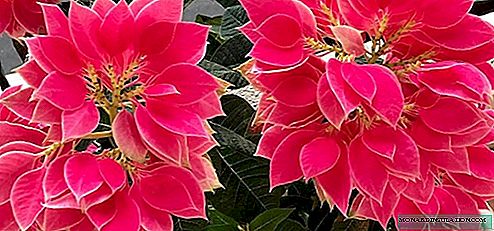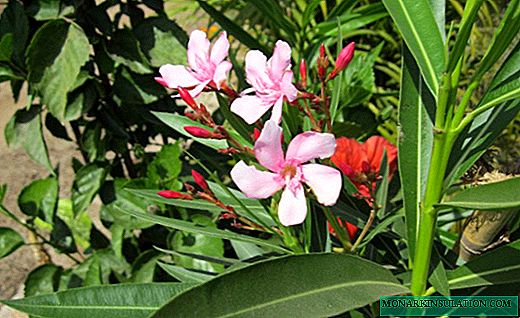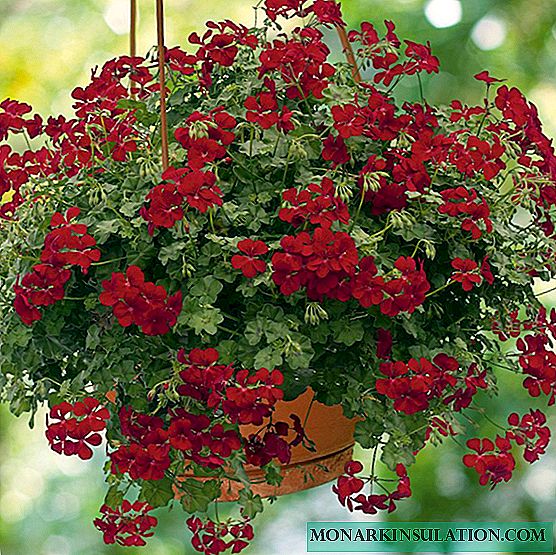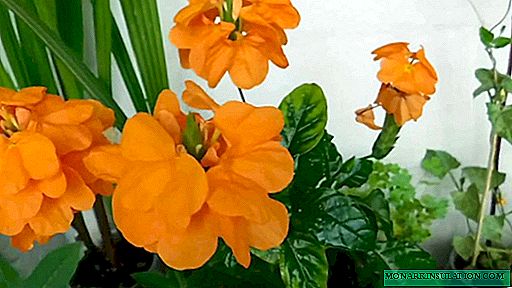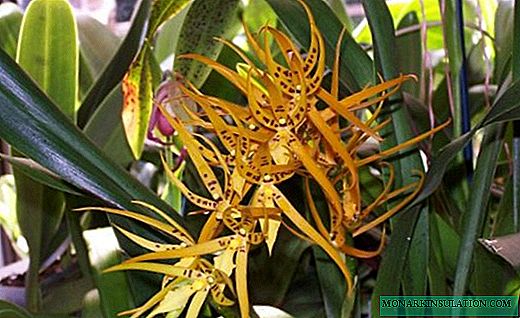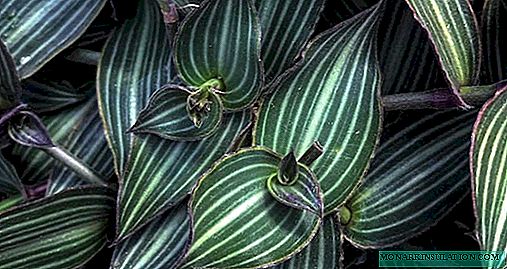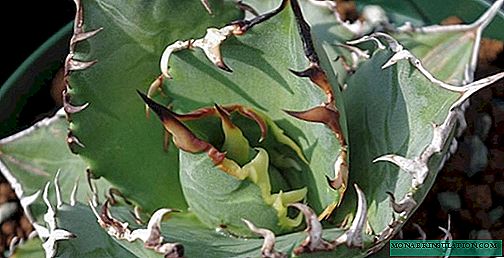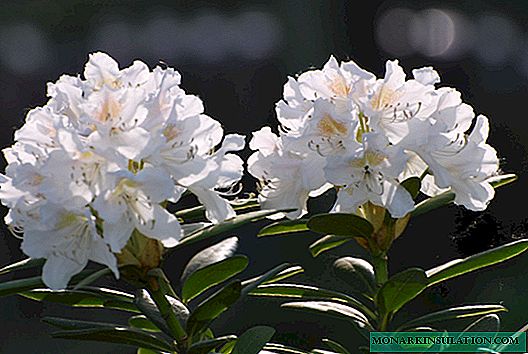Caucasian rhododendron is one of the types of evergreen flowering shrubs, especially loved by gardeners. This is due not only to the beauty of the flowering of this plant, but also to its beneficial properties. Substances obtained from this type of rhododendron become the basis not only of drugs, but also tinctures of traditional healers.
Rhododendron Caucasian: plant description
Mountain rhododendron, officially called Caucasian, belongs to the genus of rhododendrons and the Vereskov family. It is a shrub with evergreen oblong leaves and lying stems. The stems become covered with dark bark over time. In height, this plant reaches 1.5 m in the wild.

Caucasian Rhododendron Flower
The inflorescence is collected in the likeness of an umbrella, the flowers have a small corolla (diameter up to 3 cm). Their color varies from pure white to light pink. In some subspecies, the center of the flower has a scattering of red dots. Rhododendron seeds are formed in oblong capsules.
Note! In the mountains you can find not only white or pink, but also rhododendron yellow. The Caucasian species includes several different varieties, the flowers of which have differences.

When the pink mountain rhododendron begins to bloom
Differences from other species
As the name implies, the place of growth of this species of rhododendrons is the Caucasian mountains. Most often, the bush can be found at an altitude of 1600-3000 m above sea level. Mountain rosewood can be found in all the North Caucasus republics, on the southern mountain ranges in Turkey.
For your information! The roots of the rhododendron have a surface structure, and therefore serve as soil protectors on the slopes of hills and mountains.
This plant has good winter resistance. In nature, it tolerates temperatures up to −29 ° C, and therefore is suitable for growing in gardens of the cold regions of Russia.
The main feature of mountain rhododendron is its medicinal properties. In Abkhazia there are large plantations of this plant, grown specifically for medical purposes.
The chemical composition of healing rhododendron
Caucasian rosewood is a plant rich in various chemicals. The main components that can be used in medical business are contained in leaves and flowers.
They include:
- Vitamin C contained in the flowers of the plant - a component that helps the body fight viruses and absorb calcium, iron;
- tannins in the leaves. They have anti-inflammatory and restorative properties;
- essential oils extracted from both leaves and flowers improve the state of the immune system, fight inflammation and viruses.
Contained in this heather plant and a harmful component - andromedotoxin glycoside. It is a natural poison, can lead to a violation of the cardiac activity of the body.

Dried Mountain Rose Leaves
Economic value and application
Based on the beneficial components of the Caucasian rhododendron, medicines are produced for certain diseases, as well as drugs aimed at strengthening the body.
Healing properties
Preparations and tinctures based on mountain rhododendron are widely used. Among the main properties distinguish:
- diuretic;
- antipyretic;
- disinfecting;
- wound healing;
Important! In addition, such drugs have tonic properties, help in the restoration of the body after illness, raising the immune system.
Diseases in which rhododendron drugs are used:
- disorders of the cardiovascular system;
- fever;
- rheumatism;
- gout;
- neuralgia and epilepsy;
- disorders of the nervous system;
- periodontal disease and stomatitis;
- gynecological diseases.
The list is extensive, but each disease has its own nuances of treatment with similar drugs. It is important to strictly observe the dosage and other appointments of the attending physician so as not to get side effects.

This amazing flower combines beauty and healing benefits.
Application in traditional medicine
Folk healers use rhododendron in various forms: like tea, decoction or alcohol tincture. Most often, dried flowers and dried plant leaves are used.
Folk remedies with a mountain rose:
- tea from dried leaves is drunk as a cold and strengthening agent;
- from tachycardia and problems with shortness of breath in small doses, an alcoholic infusion is taken;
- a decoction of leaves helps to stabilize high blood pressure;
- douching with broth is used to treat erosion of the cervix and prostate in men.
In addition, rhododendron honey is often used in people to treat colds and boost immunity.
Important! Even in the case of honey, it is important to follow the rule - use no more than 2 tbsp. spoons per day. The components contained in the product can lead to serious problems, ranging from allergies to disorders in the functioning of the nervous system.

Rhododendron honey
Contraindications and harm to rhododendron
There are contraindications to the use of rhododendron-based drugs. They are not suitable for those who:
- the period of pregnancy and lactation has come:
- there is an allergy to the component;
- necrotic processes occur in the body.
It is better to consult a doctor before using, including folk remedies, and eliminate the risks of even worse diseases.
Preparation of medicinal raw materials
Leaves and flowers of rhododendron are collected for medicinal purposes from bushes 2-3 years old. This is done when rhododendron blooms. Usually in the mountains of the Caucasus, this is the period from mid-June to the end of July.
Raw materials are dried in a dry, well-ventilated area. Leaves and flowers are laid out on a fabric individually in a single layer. Fully dried ingredients (easily broken when compressed) are stored in a glass container for no more than two years.
Growing and propagating plants
To grow a mountain species of rhododendrons at home, you must create the usual conditions for him. Perhaps this is on a garden or a summer cottage. Rhododendron in the mountains grows in a calm, shaded space free of large trees. The north side of the site will do. The rules for planting mountain rhododendron are no different from the rules for other varieties.
Note! It is important to monitor soil moisture, as heavy rains, the effects of melting snow or a high rise in groundwater will negatively affect the bushes.
Caucasian rhododendron propagates in the same way as other species: seeds, cuttings or layering. The fastest and easiest way to start a new plant is cuttings.
Features of plant care in the first year after planting
In the first year after planting seedlings, it is important to monitor the moderation of soil moisture. In the dry season, abundant watering is needed, but in the rainy season it is better to limit the ingress of moisture to the area around the bush.
Fertilizing the first months does not need to be done, since the roots are sufficiently strengthened only in the second year after planting. It is important to remember to mulch the soil and remove weeds around the rhododendron.
To prepare for the wintering of the seedling, water-charging irrigation may be necessary, as well as shelter from coniferous branches and burlap.

Mountain view successfully grown in the garden
Diseases and Pests
Branched shrubs of rhododendrons with their lush flowering attract many insects that can destroy the plant. Experts recommend the prevention of pests.
- Slugs, snails and other mollusks are collected by hand, then the bush is processed with a tiram.
- Bed bugs, spider mites, rhododendron flies are destroyed by karbofos.
It is important to process not only the branches and leaves themselves, but also a small area around the plant in order to protect it from the re-emergence of pests.
Rhododendrons are susceptible to fungal diseases. The reasons are insufficient soil aeration and improper irrigation regime. How to cope with diseases:
- rotten shoots are completely removed;
- rust is treated with iron chelate;
- Bordeaux fluid is used as prophylaxis. Processing is carried out in early spring or late autumn.
Having grown a Caucasian rhododendron at your summer cottage, you can get not only a beautiful, but also a useful plant. The competent use of dried leaves and buds of a bush will help to quickly cope with many diseases.

